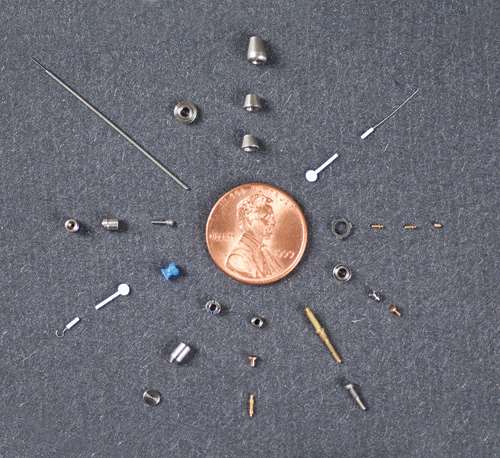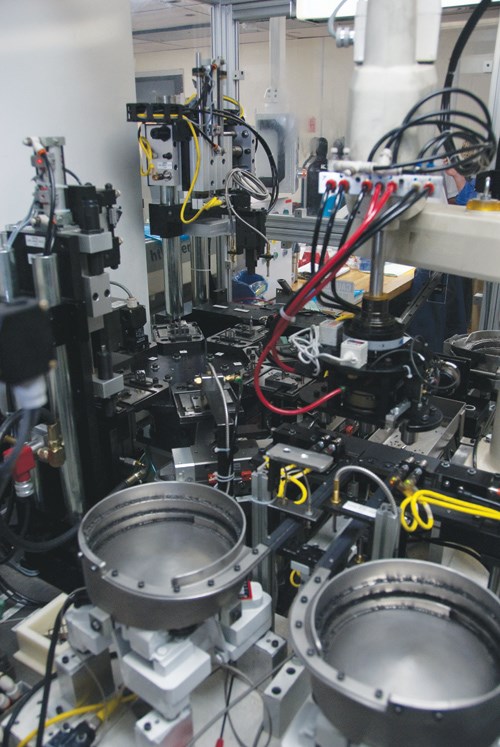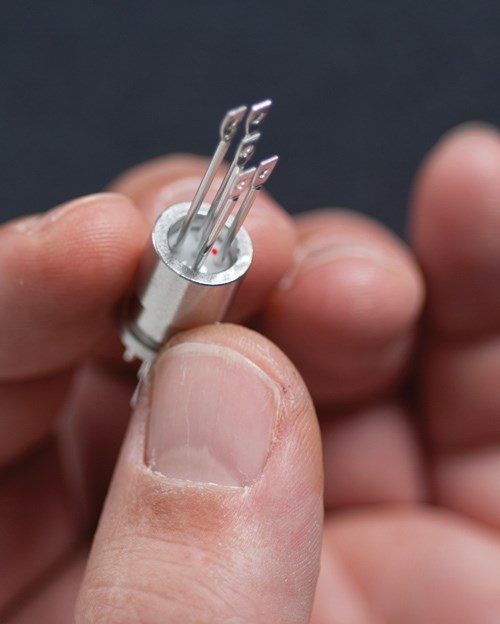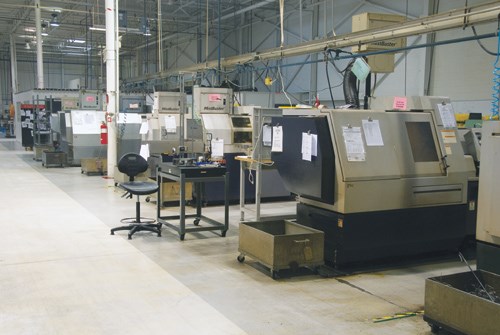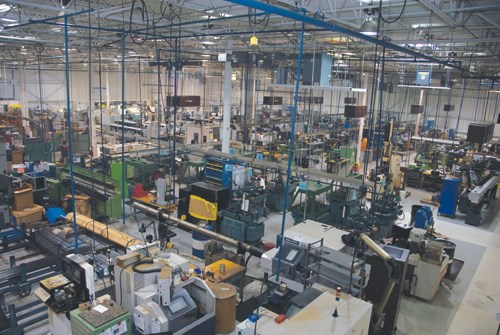Making More Than Parts for Medical
This Ohio shop succeeds in manufacturing for the medical industry by creating value for its customers beyond discrete parts manufacturing. Adding design engineering, test and measurement expertise to its contract machining capability, American-Micro has made itself a highly valued problem solver for its customers.
Sometimes we editor types get a break from longer distance travel and are able to seek out a good story in our own backyard. That’s the case here. American Micro is a precision machined products shop located in Batavia, Ohio, 15 minutes from my office door in Batavia, Ohio. Pulling into the parking lot, one is impressed with the significant number of places reserved for 25-year plus employees. In my experience, such stability is usually a sign of a well run company.
Founded in 1957 by family patriarch and Swiss émigré, Gerard Paroz, this second-generation, family-owned business specializes in production of components for the aerospace, diesel/off-road, fluid power, medical/dental device and other industries. My visit is to find out about its success in the medical/dental device field specifically, but as I found out, that success is intertwined among other industries served. Expertise in one industry is often built on success in others. They have a good story to tell in this area, and it’s a story that can play to a wider audience.
Featured Content
Being from Switzerland, the senior Mr. Paroz brought expertise in small part machining with him and as the company name implies, established it as the basis for his company. Now run by his two sons, Pierre and Rene, that initial core competency is still at the heart of the business.
Some of American Micro’s machining capabilities include precision processing of diameters from 0.004 inch to 3 inches and in lengths as long as 24 inches within tolerances down to 0.00008 inch. The company can process steel, stainless, aircraft alloys, precious metals, copper alloys and numerous other materials as specified.
However, it is interesting that the company has parlayed that core competency into a business plan that goes beyond just making parts and has taken it to a level that lets this 150-person shop play in the global arena with manufacturing joint ventures in Europe, Malaysia and China with customers spread far and wide as well. An important note, though, is that all design and engineering is done at the company’s U.S. headquarters, but more about that later.
Establish the Niche
Few groups on earth can keep secrets like the Swiss. While it is generally accepted that Swiss bankers and finance people are tight lipped, so are many Swiss machinists. Things they have learned to do through years of experience are only grudgingly passed on. Gerard Paroz had such knowledge when he started his company in 1957.
The host for my American Micro visit was J.W. Childs who is the company’s account manager. When describing the early years of the company, Mr. Childs tells how the senior Mr. Paroz would patiently present his suggested part manufacturing process to some early customers who, in turn, dismissed it in favor of another source only to find that Mr. Paroz was indeed correct. Hat in hand, the customer would come back, and in many cases, never questioned Mr. Paroz’s processing expertise again.
Of course to be fair, in the late 1950s, the small part manufacturing expertise established in Switzerland using sliding headstock machines was a relatively new technology in the U.S. outside our watch-making industry. However, it was applying Swiss-based processing technology to parts other than those for watches that became the cornerstone of American Micro. “In a way, Gerard was able to surprise many of his customers with the breadth of work that he could do on his machines,” Mr. Childs says.
And that going against the grain attitude passed to the sons as well. Being early into sliding headstock machines for making small parts gave American Micro time to develop and refine its part making skill sets. So by the time other shops caught the Swiss-type machining wave, the Paroz family had moved that aspect of the business to another level.
An example of a successful medical application that defied most expert opinions that it could be made profitably, is a cochlear implant used to replace the stirrup bone, which connects to the ear drum. “The manufacturing process for making this implant was developed by Pierre in the 1990s and has become a staple for our shop,” Mr. Childs says.
“Basically, we start with stainless wire with a 0.025 inch diameter and turn it down to 0.0045 finish dia-meter,” he continues. “The wire is threaded, bent into the shape of a shepherd’s crook and a Teflon cap is applied to the threaded end. It’s a good example of taking metal-
cutting expertise beyond just making parts to create an entire higher value assembly for our customer.”
Another segment of the medical industry that has been very successful for American Micro is test and measurement. Companies such as Everett Charles and Agilent Technologies serve the function of backing up the medical industry. Many machine shops look to the orthopedics end of medical, bone screws, hip and knee joints for example, but there is much work that can be done in the test and measurement segment as well.
Another key to successful medical applications for American Micro is correlation. “If you can’t measure it, you can’t prove you made it,” Mr. Childs says. The company has invested heavily in its metrology to the point that American Micro can measure parts better than its customer can.
“This is not because of disputes. Rather, it’s necessary to prove you are doing what you say you are doing. We keep at the cutting edge with sub-micron tolerancing capability,” Mr. Childs continues.
Metrology is the price of admission for bio-medical as well as many other industries. “The truth is, bio-medical is not the most tolerance demanding industry we serve,” he says. “With the exception of the test and measurement segment, a major specification of many medical applications is cosmetics.”
However, it’s the processing expertise gained in more demanding industries that has helped American Micro compete successfully in medical. “For us, it’s fluid power and flow technology that really stretches this shop’s capabilities,” Mr. Childs says. “Like the Sinatra song (“New York, New York”), if you can make it in fluid power and flow, you can make in virtually any industry.”
Expand the Niche
The company is an expert in fluid power. “Diesel fuel injectors are probably the most challenging work we do,” Mr. Childs says. “These components have tight tolerances and relatively high volumes. The key to successful fluid power component manufacturing is fit. The key to fit is precise machining tolerance. Up to and including match grinding—correct match grinding.” The shop uses an automated grinding cell for these critical fit components.
“Around 90 percent of the components we manufacture go into some type of flow control or flow monitoring applications,” Mr. Childs says. “It has really become one of our shop’s specialties made possible by the processing knowledge we’ve accumulated, which sets us apart from many other shops.”
Being able to produce the tolerances required between mating parts in diesel injectors, for example, has a direct impact on the company’s medical business. This process transfer from a base knowledge of how to meet the demands of one industry provides a solid base from which to participate in other industries and thus grow the business.
“It’s interesting that much of our machining expertise is fundamental—call it ‘Machining 101.’ Many customers and competitors don’t understand sealing and flow. It can be something as simple as single-point turning a component versus applying a form tool to the job. One method produces a good seal between the mating parts and the other leaks. Its knowing what process will give the desired result that saves often costly trial and error attempts. Needless to say, leaks are not good in the fluid power and flow industry and developing the expertise to manufacture and assemble reliable components is a foundation competency of American Micro,” Mr. Childs says. He cites an example of how understanding flow control and seal translates into a medical application.
“We have a customer that was fighting flow on a hydro-mechanical device that was failing in leak and seal, in part because its hydraulics were saline-based aqueous fluid. The reason for using this saline-based hydraulic fluid was that it could come in contact with the body tissue, so it had to be inert. Moreover, the unit was dealing with pressures from 2,000 to 3,000 psi. We solved the problem for this medical application using our knowledge about flow and seal technologies.”
Do More Than is Expected
Of course, technology is democratic. Anybody with enough money can buy Swiss machines, multi-spindles, Escomatics or other machines. However, it’s how these technologies are applied that differentiates competing shops. The trick is to add unique value to what is done for the customer.
“When I started here 11 years ago, our philosophy, like most machine shops, was basically if we don’t make it we don’t sell it,” Mr. Childs recalls. “Through the years, we have opened our mind to the concept that you really don’t have to make everything in-house. Rather, there is good business in creating advanced assembly and top-tier assembly work for the customer, which makes your part production capabilities even more valuable because you can take the next step for the customer, and as a single source, usually save the customer money.
“We are transitioning from a contract manufacturer to an engineered products contract manufacturer,” Mr. Childs continues. The distinction is more than subtle. “In effect, we try to become a general contractor for our customer’s products—making what we have capacity for, engineering and subbing out what we don’t and coordinating the whole thing into an assembled usable product. It’s really opening up tremendous opportunities. We believe this model represents the future of domestic based manufacturing. You must do more than just make parts.”
That’s where American Micro’s other plants come in. The foreign ventures make components that are process engineered here and manufacture them overseas. “That frees up production time in our headquarter shop for more advanced and demanding jobs that are less price sensitive,” Mr. Childs says.
Pick Your Customers Carefully
As enlightened as American Micro’s evolving business model is, it also takes enlightened customers to understand the nuances. “We are as careful picking customers as we are at picking vendors,” Mr. Childs says. “We are not in the commodity business and our customers are not either. “It is our stated goal to be a trusted advisor to our customer base, and they respond with trust that we can do what we say we can do. We believe this is a sustainable model for this company, ongoing.”
RELATED CONTENT
-
6 Tips for Training on a Swiss-Type Lathe
There are nuances to training a person to effectively operate a Swiss-type lathe. A shop I visited a while back offers some suggestions.
-
Making Parts on a Swiss/Laser Machine
Adding laser cutting to Swiss-type machining is helping this shop do more work for its customers in the medical industry.
-
Understanding CNC Collet Chucks
Workholding for turning is usually fairly basic: The selection comes down to chucks or collets. This article looks at when to consider the collet chuck and what kind might be best for a given application.


